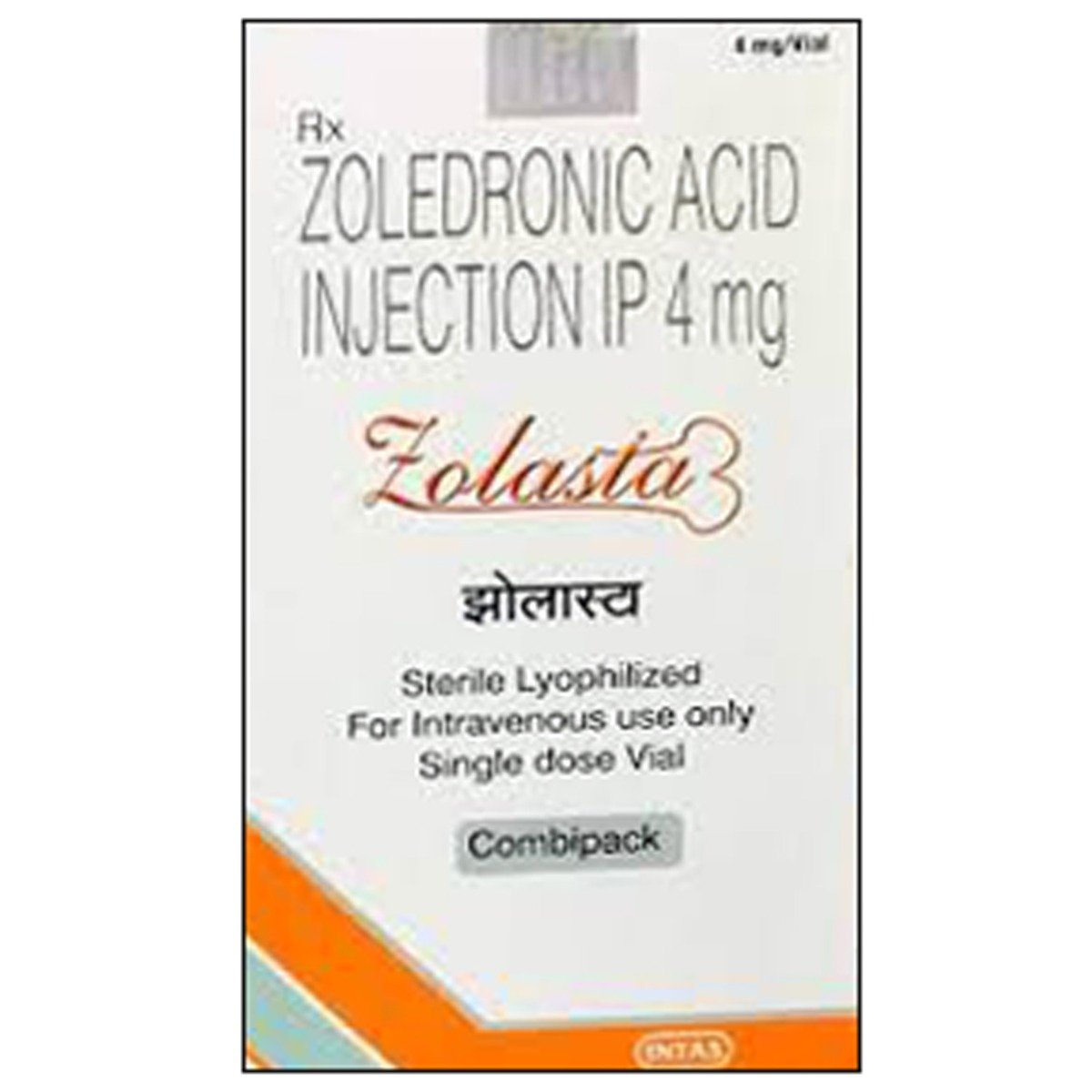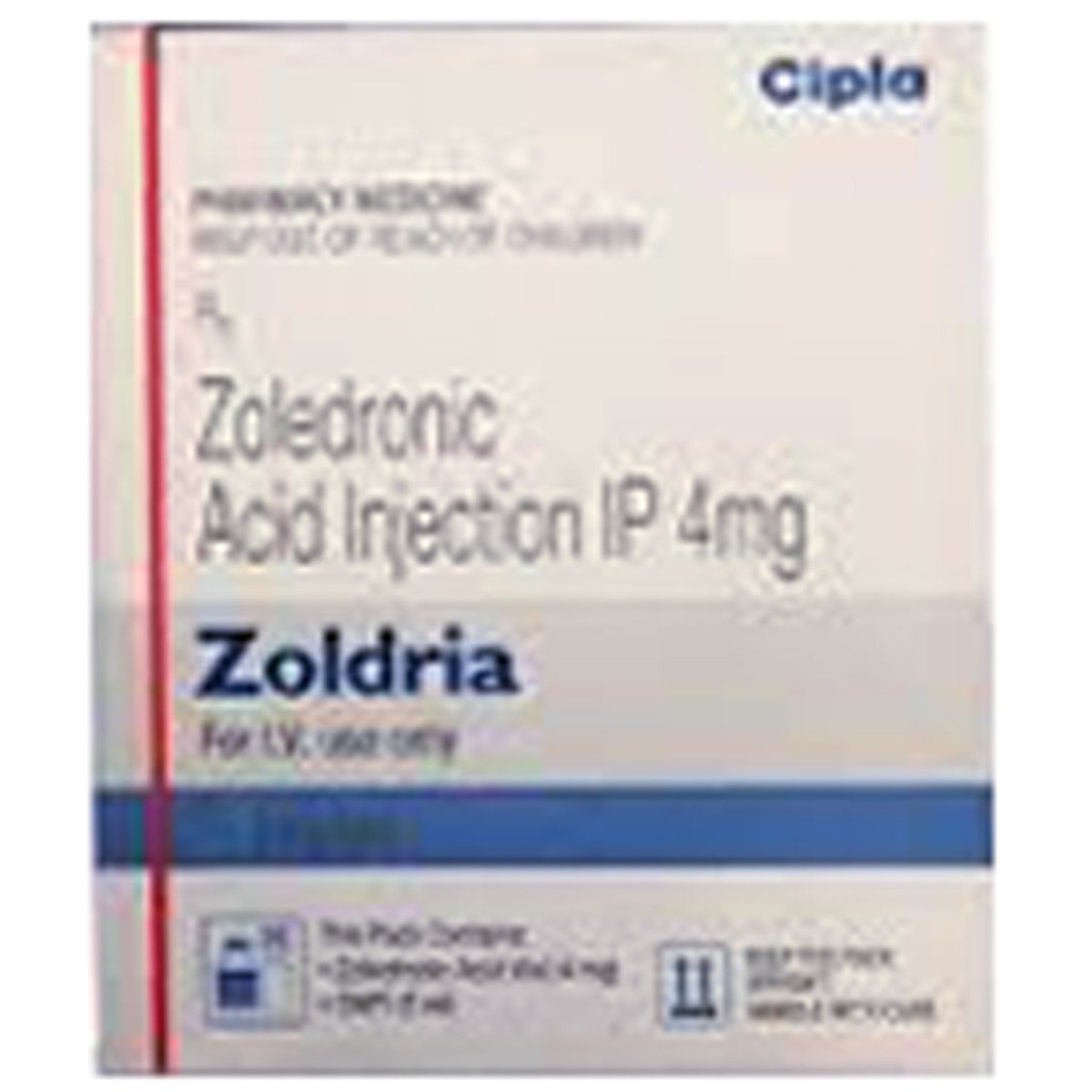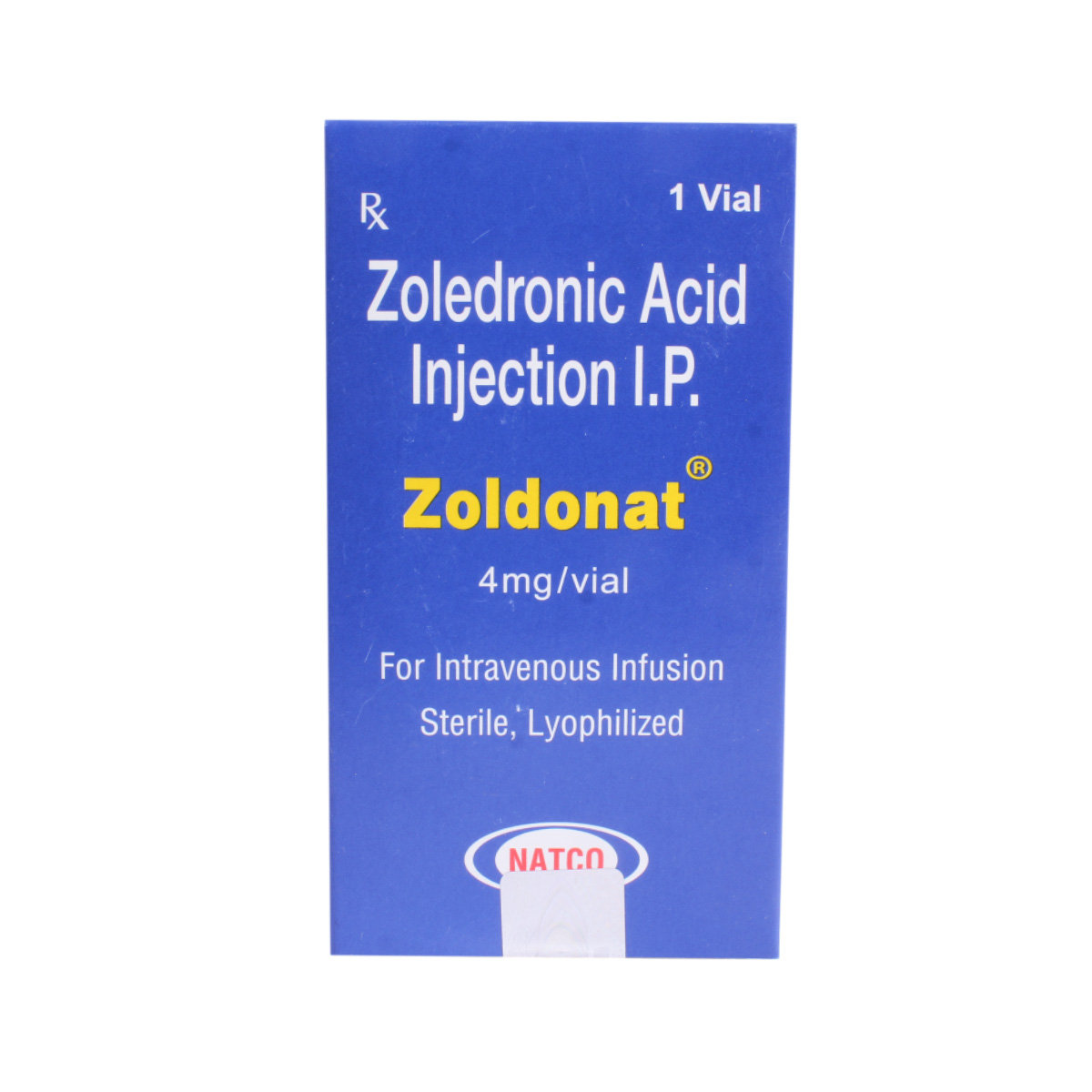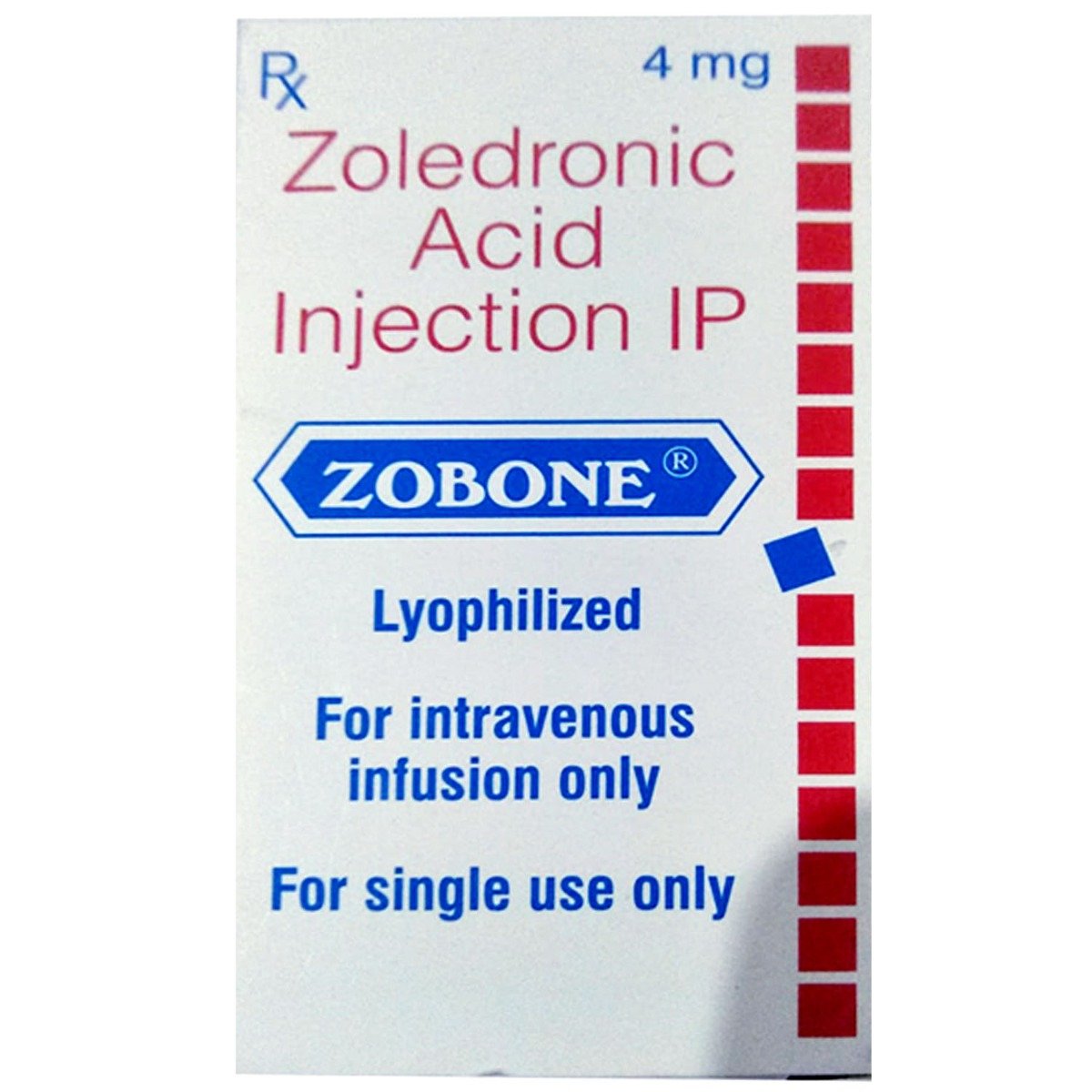Zoldron 4Mg Inj
MRP ₹2489
(Inclusive of all Taxes)
₹373.4 Cashback (15%)
Provide Delivery Location
Online payment accepted
 Prescription drug
Prescription drugWhats That
Composition :
Manufacturer/Marketer :
Consume Type :
Expires on or after :
Return Policy :
About Zoldron 4Mg Inj
Zoldron 4Mg Inj belongs to the class of medicines called 'bisphosphonates' used to treat osteoporosis (weak and brittle bones) caused by menopause or long-term steroid use. Zoldron 4Mg Inj also treats Paget’s bone and high calcium levels caused by cancer. Osteoporosis is a bone disease that weakens and thins bones by decreasing bone density, common in post-menopausal women. As the density of bones decreases, they weaken and are more likely to break.
Zoldron 4Mg Inj contains Zoledronic acid that works by binding to the bone tightly and preventing the removal of calcium by osteoclasts (a type of bone cell that destroys bone tissue). This prevents osteoclasts from breaking down the bone and keeps the bones strong and minimizes the risk of bones breaking.
A doctor or nurse will administer Zoldron 4Mg Inj. In some cases, you may experience headache, fever, nausea, dizziness, vomiting, back pain, diarrhea, pain in the muscles, joints, or bones, swelling, or pain at the infusion site. Most of these side effects of Zoldron 4Mg Inj do not require medical attention and gradually resolve over time. However, if the side effects persist or worsen, please consult your doctor.
If you are allergic to Zoldron 4Mg Inj or any other medicines, please tell your doctor. Avoid taking Zoldron 4Mg Inj if you are pregnant or breastfeeding and consult a doctor. Zoldron 4Mg Inj is not recommended for children below 18 years as the safety and effectiveness were not established. Avoid taking Zoldron 4Mg Inj if you have hypocalcemia (low calcium levels in the blood) and severe kidney problems. Drive only if you are alert as Zoldron 4Mg Inj may cause dizziness. Zoldron 4Mg Inj may cause osteonecrosis of the jaw (ONJ) in some patients. Therefore, if you experience any problems with teeth or mouth such as loose teeth, swelling or pain, non-healing of sores, or discharge, consult your doctor and dentist as these might be signs of osteonecrosis of the jaw.
Uses of Zoldron 4Mg Inj
Directions for Use
Key Benefits
Zoldron 4Mg Inj contains Zoledronic acid used to treat postmenopausal osteoporosis, Paget’s disease, and hypercalcemia of malignancy (bone cancer in which excess of calcium exits). Zoldron 4Mg Inj binds to the bone tightly and prevents calcium removal by osteoclasts (a type of bone cell that destroy bone tissue). This prevents osteoclasts from breaking down the bone, strengthening bones, and minimizing the risk of bones breaking. Also, Zoldron 4Mg Inj may reduce calcium levels in the blood by preventing calcium reabsorption from bones to the blood. Thus, it helps in treating high calcium levels in the blood caused by cancer.
Storage
- Inform your doctor about the nausea and discuss possible alternatives to the medication or adjustments to the dosage.
- Divide your daily food intake into smaller, more frequent meals to reduce nausea.
- Opt for bland, easily digestible foods like crackers, toast, plain rice, bananas, and applesauce.
- Avoid certain foods that can trigger nausea, such as fatty, greasy, spicy, and smelly foods.
- Drink plenty of fluids, such as water, clear broth, or electrolyte-rich beverages like coconut water or sports drinks.
- Use ginger (tea, ale, or candies) to help relieve nausea.
- Get adequate rest and also avoid strenuous activities that can worsen nausea.
- Talk to your doctor about taking anti-nausea medication if your nausea is severe.
- Record when your nausea occurs, what triggers it, and what provides relief to help you identify patterns and manage your symptoms more effectively.
- Rest well; get enough sleep.
- Eat a balanced diet and drink enough water.
- Manage stress with yoga and meditation.
- Limit alcohol and caffeine.
- Physical activities like walking or jogging might help boost energy and make you feel less tired.
- Inform your doctor about your constipation symptoms. They may adjust your medication or advise alternative treatments.
- Stay hydrated by drinking sufficient of water (at least 8-10 glasses a day) to help soften stool and promote bowel movements.
- Increase fibre intake by eating foods high in fibre, such as fruits, whole grains, vegetables and legumes, to help bulk up the stool.
- Establish a bowel routine by trying to go to the bathroom at the same time each day to train your bowels.
- Engaging in regular exercise, like walking or yoga, can support in bowel movement stimulation.
- Consult your doctor if constipation persists, and discuss alternative treatments or adjustments to your medication.
- Preventing Vomiting (Before it Happens)
- Take medication exactly as prescribed by your doctor. This can help minimize side effects, including vomiting.
- Having a small meal before taking your medication can help reduce nausea and vomiting.
- Talk to your doctor about taking anti-nausea medication along with your prescribed medication.
- Managing Vomiting (If it Happens)
- Try taking ginger in the form of tea, ale, or candy to help alleviate nausea and vomiting.
- What to Do if Vomiting Persists
- Consult your doctor if vomiting continues or worsens, consult the doctor for guidance on adjusting your medication or additional treatment.
- Tell your doctor immediately if you experience shortness of breath after taking medication.
- Your doctor may adjust the medication regimen or dosage or give alternative medical procedures to minimize the symptoms of shortness of breath.
- Monitor your oxygen levels and breathing rate regularly to track changes and potential side effects.
- For controlling stress and anxiety, try relaxation techniques like deep breathing exercises, meditation, or yoga.
- Make lifestyle changes, such as quitting smoking, exercising regularly, and maintaining a healthy weight.
- Seek emergency medical attention if you experience severe shortness of breath, chest pain, or difficulty speaking.
- Follow up regularly with your doctor to monitor progress, adjust treatment plans, and address any concerns or questions.
Drug Warnings
If you are allergic to Zoldron 4Mg Inj or any other medicines, please tell your doctor. Avoid taking Zoldron 4Mg Inj if you are pregnant or breastfeeding and consult a doctor. Zoldron 4Mg Inj is not recommended for children below 18 years as the safety and effectiveness were not established. Avoid taking Zoldron 4Mg Inj if you have hypocalcemia (low calcium levels in the blood) and severe kidney problems. Drive only if you are alert as Zoldron 4Mg Inj may cause dizziness. If you are not able to take daily calcium supplements, have had sections of the intestine or some or all of the parathyroid glands in the neck surgically removed, have cancer, gum disease, poor dental health, or planned tooth extraction or kidney problem, inform your doctor before taking Zoldron 4Mg Inj. If you are a smoker, inform your doctor before receiving Zoldron 4Mg Inj as it may increase the risk of dental problems. Zoldron 4Mg Inj may cause osteonecrosis of the jaw (ONJ) in some patients. Therefore, if you experience any problems with teeth or mouth such as loose teeth, swelling or pain, non-healing of sores, or discharge, consult your doctor and dentist as these might be signs of osteonecrosis of the jaw. You are recommended to drink at least 2 glasses of fluids before and after treatment with Zoldron 4Mg Inj as advised by your doctor to prevent dehydration. Take calcium and vitamin D supplements as prescribed by your doctor as Zoldron 4Mg Inj may reduce calcium levels in the blood.
Drug-Drug Interactions
Drug-Drug Interactions
Login/Sign Up
Co-administration of Cidofovir and Zoldron 4Mg Inj can increase the risk of kidney problems.
How to manage the interaction:
Taking Cidofovir and Zoldron 4Mg Inj together is not recommended as it can lead to an interaction, it can be taken if advised by a doctor. However, if you experience any symptoms like nausea, vomiting, loss of hunger, increased or decreased urination, sudden weight gain or weight loss, fluid retention, swelling, shortness of breath, muscle cramps, tiredness, weakness, dizziness, confusion, and irregular heart rhythm, contact your doctor immediately. Do not discontinue any medications without consulting a doctor.
Taking Tacrolimus with Zoldron 4Mg Inj may increase risk of kidney problems.
How to manage the interaction:
Although taking Tacrolimus and Zoldron 4Mg Inj together can possibly result in an interaction, it can be taken if a doctor has prescribed it. However, consult the doctor immediately if you experience symptoms such as nausea, vomiting, loss of hunger, increased or decreased urination, sudden weight gain or weight loss, fluid retention, swelling, shortness of breath, muscle cramps, tiredness, weakness, dizziness, confusion, and irregular heart rhythm. Do not discontinue any medications without consulting a doctor.
Co-administration of Zoldron 4Mg Inj and Tenofovir alafenamide can increase the risk of kidney problems.
How to manage the interaction:
Taking Zoldron 4Mg Inj and Tenofovir alafenamide together can lead to an interaction, it can be taken if advised by a doctor. However, if you experience any symptoms like nausea, vomiting, loss of appetite, increased or decreased urination, sudden weight gain or weight loss, fluid retention, swelling, shortness of breath, bone pain, muscle cramps, tiredness, weakness, dizziness, confusion, and irregular heart rhythm, contact a doctor immediately. Do not discontinue any medications without consulting a doctor.
Co-administration of Zoldron 4Mg Inj (oral form) with Deferasirox can increase the risk of bleeding and ulcers in the stomach and intestines.
How to manage the interaction:
Although taking Zoldron 4Mg Inj and Deferasirox together can possibly result in an interaction, it can be taken if your doctor has prescribed it. However, if you experience nausea, vomiting, loss of appetite, increased or decreased urination, fluid retention, swelling, shortness of breath, bone pain, muscle cramps, tiredness, weakness, dizziness, confusion, or irregular heart rhythm, seek immediate medical attention. Drink plenty of water if you experience diarrhoea or vomiting while taking these medications, as dehydration can potentially affect the kidneys. Do not discontinue any medications without a doctor's advice.
Co-administration of Sirolimus and Zoldron 4Mg Inj can increase the risk or severity of kidney problems.
How to manage the interaction:
Taking Sirolimus and Zoldron 4Mg Inj together can lead to an interaction, but it can be taken if a doctor advises. However, if you experience any symptoms like nausea, vomiting, loss of appetite, increased or decreased urination, sudden weight gain or weight loss, fluid retention, swelling, shortness of breath, muscle cramps, tiredness, weakness, dizziness, confusion, and irregular heart rhythm, contact a doctor immediately. Do not discontinue any medications without consulting a doctor.
Co-administration of Human immunoglobulin with Zoldron 4Mg Inj, may raise the risk of kidney problems.
How to manage the interaction:
There may be a possibility of interaction between Human immunoglobulin and Zoldron 4Mg Inj, but it can be taken if prescribed by a doctor. However, if you experience nausea, vomiting, loss of appetite, increased or decreased urination, sudden weight gain or loss, fluid retention, swelling, shortness of breath, muscle cramps, tiredness, weakness, dizziness, confusion, or an irregular heart rhythm, consult a doctor. Do not discontinue any medications without consulting a doctor.
Drug-Food Interactions
Drug-Food Interactions
Login/Sign Up
Diet & Lifestyle Advise
- Include dairy products like milk, yoghurt, cheese, or milk-based custard in your diet.
- Eat daily a serving of broccoli, cabbage, bok choy (Chinese white cabbage), spinach, and other green leafy vegetables.
- Snack on calcium-rich nuts like Brazil nuts or almonds.
- Sprinkle sesame seeds over your food, vegetables, and salads. Sesame seeds are high in calcium.
- Avoid or reduce the intake of caffeine, soft drinks, and alcohol that inhibit calcium absorption.
- Replace the meat with tofu or tempeh for extra calcium in your food.
Side Effects of Zoldron 4Mg Inj
- Headache
- Fever
- Nausea
- Dizziness
- Vomiting
- Back pain
- Diarrhoea
- Flu-like symptoms (chills, tiredness, muscle, and joint pain)
- Pain in the muscles, joints, or bones
- Swelling or pain at the infusion site
Habit Forming
Therapeutic Class
All Substitutes & Brand Comparisons
RX
Out of StockDrocid 4 mg Infusion 100 ml
Otsuka Pharmaceuticals Pvt Ltd
₹2499
(₹24.99/ 1ml)
98% CHEAPERRX
Zolasta 4mg Injection 10 ml
Intas Pharmaceuticals Ltd
₹2511.5
(₹226.04/ 1ml)
89% CHEAPERRX
Osteomet 4Mg Inj
Neon Laboratories Ltd
₹519.5
(₹467.6 per unit)
79% CHEAPER
Author Details
We provide you with authentic, trustworthy and relevant information
Drug-Diseases Interactions
Drug-Diseases Interactions
Login/Sign Up
FAQs
Drug-Drug Interactions Checker List
- GENTAMICIN
- FUROSEMIDE
Special Advise
- A preventive dental check-up is required before using Zoldron 4Mg Inj as it has been reported to cause osteonecrosis of the jaw.
- A blood test is recommended before taking each dose of Zoldron 4Mg Inj to monitor kidney functioning.
- Regular intake of calcium and vitamin D may be recommended by your doctor while taking treatment with Zoldron 4Mg Inj.
- While using Zoldron 4Mg Inj, you may experience musculoskeletal pain, in this case, stop taking Zoldron 4Mg Inj and consult a doctor.
Disease/Condition Glossary
Osteoporosis: It is a bone disease that weakens and thins bones by decreasing bone density. As the density of bones decreases, they weaken and are more likely to break. Post-menopausal women are more likely to develop osteoporosis than men because, at menopause, women’s ovaries stop producing estrogen (a female hormone) essential to keeping bones healthy. Following menopause, bone loss occurs, making bones weak and more likely to break. Also, long-term use of steroids may affect bone strength and cause osteoporosis in both men and women. Signs and symptoms include back pain caused by a fractured or collapsed vertebra, loss of height over time, a stooped posture, and a bone that breaks much more easily than expected.
Paget’s disease: In Paget’s disease, bone remodeling (removal of old bone and replacement with new bone material) is too quick, and new bone is formed in a disordered manner making it weaker than normal. If left untreated, the bone may become deformed, painful, and broken.

Have a query?
Alcohol
Safe if prescribed
Interaction of alcohol with Zoldron 4Mg Inj is unknown. Please consult a doctor before consuming alcohol with Zoldron 4Mg Inj.
Pregnancy
Consult your doctor
Zoldron 4Mg Inj is a category D pregnancy drug and is not recommended for pregnant women as it may harm an unborn baby. Please consult a doctor if you are pregnant.
Breast Feeding
Consult your doctor
Zoldron 4Mg Inj is contraindicated in breastfeeding mothers. Therefore, please consult a doctor if you are breastfeeding.
Driving
Safe if prescribed
Zoldron 4Mg Inj may cause dizziness. Therefore, avoid driving or operating machinery if you feel dizzy after taking Zoldron 4Mg Inj.
Liver
Consult your doctor
Take Zoldron 4Mg Inj with caution, especially if you have a history of Liver diseases/conditions. The dose may be adjusted by your doctor as required.
Kidney
Consult your doctor
Take Zoldron 4Mg Inj with caution, especially if you have a history of Kidney diseases/conditions. The dose may be adjusted by your doctor as required. Avoid taking Zoldron 4Mg Inj if you have severe kidney problems.
Children
Safe if prescribed
Zoldron 4Mg Inj is not recommended for children below 18 years as the safety and effectiveness were not established.













